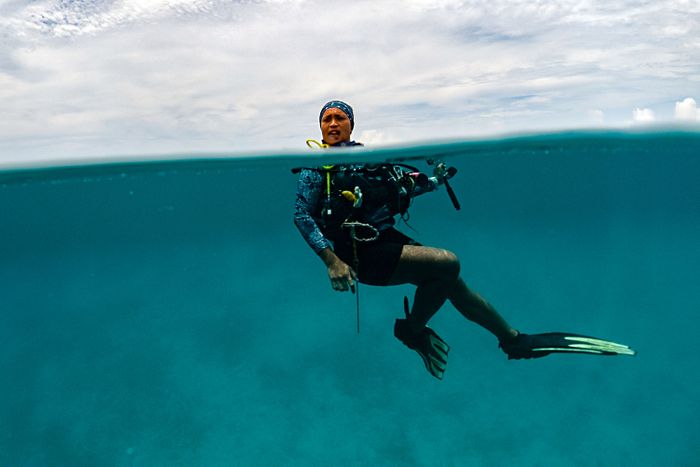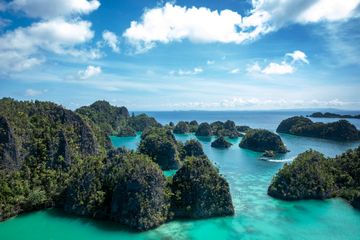REDUCING PLASTIC WASTE
I am reminded of a study by Joleah B. Lamb et al, Plastic Waste Associated with Disease on Coral Reefs (2018). Plastic waste can increase microbial colonization by pathogens in the ocean. When coral reefs come into contact with plastic, the likelihood of disease increases from four to 89 percent.
And then there is the issue of tourists, who did not seem to care much about the environment. Marcel gave an example regarding to liveaboard tours in Rajaampat. “They would lift up their anchors at diving sites or in protected areas,” he said.
According to Marsel, the majority of waste comes from Sorong and Waisai. Wawan echoed his sentiment. “Sorong has become the second largest town in Papua after Jayapura. Even the municipal government acknowledged that they were overwhelmed. They need help from partners and the local community to join their efforts in reducing waste,” he said. “In Biak, a local ordinance was established to ban plastic bags, so everyone is back to using noken.”
Reducing waste is an end-to-end undertaking. In addition to initiatives like beach cleanups, incentives for innovation and plastic recycling are needed, along with strategies to reduce plastic use.
“There will be a lot more environmental issues in the future,” added Wawan. Climate change has become more and more evident. Coral bleaching has increased—a tell-tale sign of declining water quality in the oceans. “Scientifically speaking, climate change is inevitable. But what we can control is to ensure environmentally-friendly waste management and tourism.”

THE MORAL OF THE STORY
I walked away with two memorable encounters. Having witnessed both majestic whales and pervasive waste at the same time, I asked myself: what is God's Plan for Rajaampat? What role will humans play?
We set sail from Sorong to Waisai. Along the way, we saw plastic trash drifted along the ocean surface. At one point, crew members had to shut down the engine to prevent the trash from clogging the propellers.
As soon as we were back on course, one of the crew members, Mei Habel Faidan, shouted, “Look! Whales!”
Marsel, who was captain of the boat, shut down the engine again. We sailed slowly. I saw three Sperm whales—swimming on the surface. A gust of air mixed with seawater was released from their blowholes.
Wooooooshhhh!
A family of whales came and approached our boat. They got so close, only two or three meters away from us. I heard their distinctive clicking sound, as if they were welcoming us to Rajaampat.
I told this story to every person I met. And they all said, “You are a lucky man. A blessed man.”
At first, I was confused. Is it really a rare moment, seeing whales? Turns out, it is. Many locals are still waiting for the honor.
Yet for some miraculous reason, it happened to me more than once. On our last day in Rajaampat, on our return journey from West Yensawai to Sorong, it happened again. This time, plastic waste was actually stuck in the propeller, stalling the engine. We stopped for quite some time, another boat leaving us behind.
After the engine was fixed, it was Habel once again who noticed movement in the water. Marsel turned off the engine. I saw the vast expanse of sea as the ship sailed slowly. And then, a whale came to the surface. It happened very quickly. And then it was gone. We didn’t have time to notice what type of whale it was. It was grayish.
So if seeing a whale was supposed to be a rare moment, why did it happen to me twice? And yet, with all the trash floating in the oceans, is there a chance for this Earth to be sustainable? Or will it only be the fairy tale that it is today? Alas, it is up to us to take care of nature with all our might. Marsel himself has witnessed how a healthy ocean has been a blessing to him. “Conservation is the answer to our prayers,” he said.
—Fikri Muhammad Staff Writer of this magazine, who has a newfound interest in diving upon visiting Rajaampat. Donny Fernando, Staff Photographer, who has enriched his perspectives on conservation upon this debut assignment.

